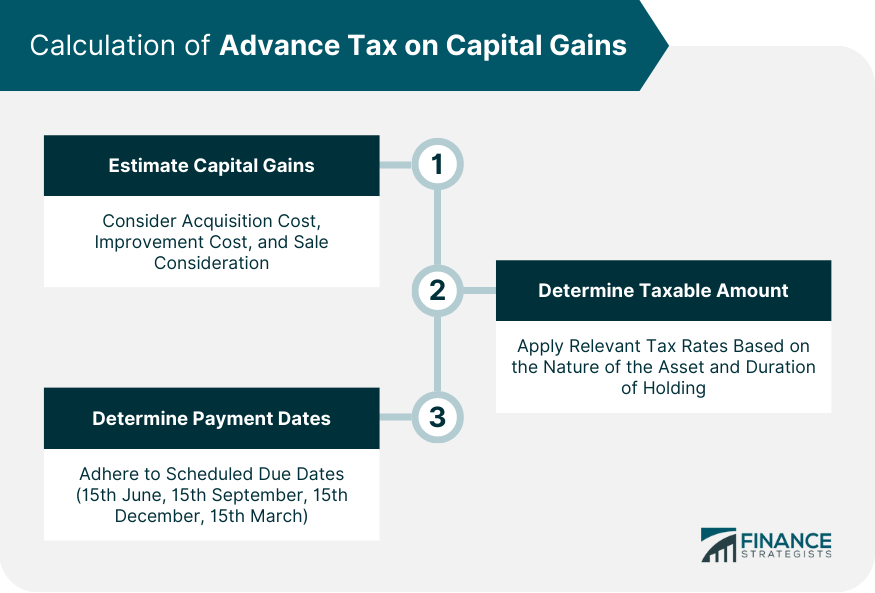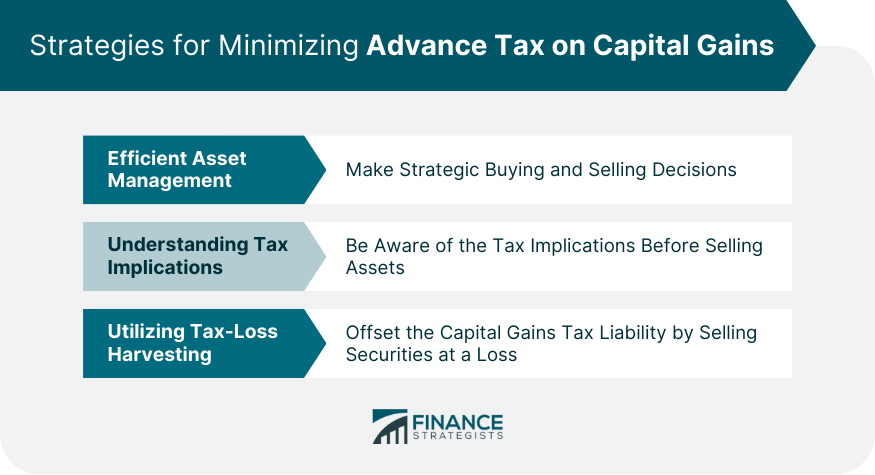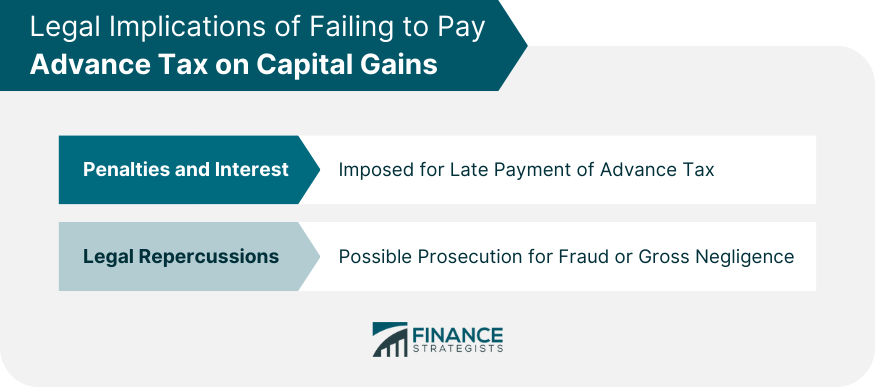Capital gains refer to the increase in value of a capital asset, such as stocks, bonds, real estate, or other investments, from the time of purchase until the time of sale. The understanding of capital gains is crucial for managing tax obligations when an asset is sold for profit. Capital assets come in various forms. For individuals, they can include homes, personal-use items such as household furnishings, and investments like stocks, bonds, or land. Certain intangible assets, like patents and copyrights, also qualify as capital assets. Capital gains are categorized as either short-term or long-term. If an asset is held for one year or less before selling, it is considered a short-term gain, while holding an asset for more than a year before selling qualifies it as a long-term gain. The duration of asset holding significantly impacts the applied tax rate and available methods for minimizing the tax liability. Advance tax refers to a mechanism used by numerous jurisdictions worldwide, which mandates taxpayers to pay taxes on their income throughout the year. This is instead of making a one-time payment at the end of the tax year. Notably, this approach includes paying taxes on capital gains, which essentially are profits realized from the sale of assets. In the United States, there is no specific provision for advance tax on capital gains. Capital gains signify the increase in the value of investments or real estate properties above their original purchase prices. Capital gains tax, on the other hand, is the tax on these gains. This tax is typically paid after realizing the capital gains, which usually occurs after selling the asset. The rate of capital gains tax in the U.S. hinges on the duration an asset was held before being sold. Long-term gains, which are from assets held for over a year, are taxed at a lower rate compared to short-term gains from assets held for less than a year. Contrarily, countries like India have a specific advance tax system. In India, any individual whose estimated tax liability for the year is Rs. 10,000 or more must pay advance tax. If a taxpayer anticipates earning capital gains during a specific quarter of the year, they must pay advance tax on those gains within the same quarter. In order to estimate capital gains, investors need to understand the nature of their investments. They must consider the acquisition cost, improvement cost, and the sale consideration. Capital gains can be calculated by subtracting the cost of acquisition from the sale consideration. This process can be complex for assets held over a long period or those that have undergone improvements or renovations. Once the capital gain has been determined, it's crucial to calculate the tax on that gain. Depending on the nature of the asset and the duration of holding, the tax rates will vary. This step is essential to know exactly what you owe and to avoid any unpleasant surprises when tax time arrives. The advance tax needs to be paid in installments. The due dates, as per income tax rules, are 15th June (15% of tax), 15th September (45%), 15th December (75%), and 15th March (100%). It's essential to keep these dates in mind as missing them can result in penalties for late payment. Efficient asset management can help minimize the advance tax on capital gains. This could involve selecting the right time to buy or sell an asset or holding onto an asset for a period of time that qualifies it for favorable long-term capital gains treatment. In other words, strategic buying and selling decisions can greatly affect your capital gains tax liabilities. Before selling any assets, it's critical to understand the tax implications. For instance, selling an asset after holding it for more than a year may result in a lower tax rate, as it becomes a long-term capital gain. Proper planning and awareness of the tax implications can lead to substantial tax savings. Tax-loss harvesting is a strategy that can help offset the capital gains tax liability. It involves selling securities at a loss to offset a capital gains tax liability. This strategy requires careful consideration and a thorough understanding of market conditions and investment performance. In India, if the advance tax is not paid according to schedule, the taxpayer is liable to pay interest under sections 234B and 234C of the Income Tax Act. Additionally, the Income Tax Department can levy penalties under Section 221 of the Act. These financial penalties can add up quickly, creating an even larger financial burden. If the failure to pay advance tax is due to fraud or gross negligence, the Income Tax Department may pursue more severe legal action, including prosecution. Beyond the financial penalties, these legal actions can lead to reputational damage and additional legal costs. Advance tax can be paid through various methods including physical payment at designated banks and online payment through the taxpayer's bank's internet banking or through the Income Tax Department's website. Opt for the method that best fits your lifestyle and ensures timely payment. Once the payment is made, the taxpayer should ensure they receive a challan from the bank or a digital receipt when paid online. This serves as proof of payment. When filing their income tax return, the taxpayer should include the details of the advance tax payments. This record keeping is crucial for validating your payments and ensuring your annual tax return is accurate. Capital gains, stemming from the appreciation in value of capital assets like stocks, bonds, and real estate, carry significant tax implications. Understanding these implications becomes pivotal, especially in light of advance tax, which is a system prevalent in several countries that mandates taxpayers to pay taxes on their earnings—including capital gains—progressively throughout the year. While the U.S. does not have a provision for advance tax on capital gains, India’s tax structure demands adherence to this principle, given certain thresholds. Efficient strategies like optimal asset management, comprehension of tax implications before asset disposal, and leveraging tax-loss harvesting can greatly aid in reducing tax liabilities. However, non-compliance or tardy advance tax payments can lead to hefty penalties, accrued interests, and even potential legal consequences in grave cases. For expert guidance on structuring your assets and planning your taxes, consider seeking professional tax planning services.Understanding the Concept of Capital Gains
Understanding Advance Tax on Capital Gains
Concept of Advance Tax
Capital Gains and Tax in the United States
Advance Tax in India
Calculation of Advance Tax on Capital Gains
Estimate Capital Gains
Figure the Taxable Amount
Determine the Payment Dates and Amounts

Strategies for Minimizing Advance Tax on Capital Gains
Efficient Asset Management
Understanding Tax Implications of Selling Assets
Utilizing Tax-Loss Harvesting

Legal Implications of Failing to Pay Advance Tax on Capital Gains
Penalties and Interest
Possible Legal Repercussions

Navigating the Advance Tax Payment Process
Payment Options
Filing the Payment
Bottom Line
Advance Tax on Capital Gains FAQs
Advance tax on capital gains is the tax paid in the same year the income is received, in advance installments, on the profit made from selling capital assets.
To calculate advance tax on capital gains, estimate your total income for the year, determine your capital gains, figure out the taxable amount, and schedule your payment dates.
Strategies to minimize advance tax on capital gains include efficient asset management, understanding tax implications of selling assets, and utilizing tax-loss harvesting.
Not paying advance tax on capital gains can result in penalties, interest charges, and in cases of fraud or gross negligence, more severe legal action.
The advance tax payment process involves choosing a payment method (physical or online), making the payment, receiving a challan or digital receipt, and including details in your tax return.
True Tamplin is a published author, public speaker, CEO of UpDigital, and founder of Finance Strategists.
True is a Certified Educator in Personal Finance (CEPF®), author of The Handy Financial Ratios Guide, a member of the Society for Advancing Business Editing and Writing, contributes to his financial education site, Finance Strategists, and has spoken to various financial communities such as the CFA Institute, as well as university students like his Alma mater, Biola University, where he received a bachelor of science in business and data analytics.
To learn more about True, visit his personal website or view his author profiles on Amazon, Nasdaq and Forbes.















